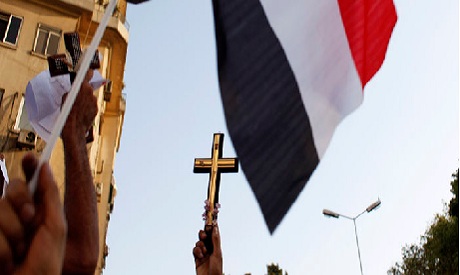 "We're told it's a good thing that they decided to change the date of parliamentary elections to avoid their falling on the Easter holidays," said Nabil, a Coptic-Christian silversmith in Cairo's Heliopolis district. "I was really dismayed by the original date, but – let's face it – these aren't the easiest times for Christians."
"We're told it's a good thing that they decided to change the date of parliamentary elections to avoid their falling on the Easter holidays," said Nabil, a Coptic-Christian silversmith in Cairo's Heliopolis district. "I was really dismayed by the original date, but – let's face it – these aren't the easiest times for Christians."
Speaking shortly after Egypt's presidency changed the electoral timetable – which had initially failed to take into account Coptic Easter celebrations – Nabil said: "It's not just the Muslim Brotherhood [the group from which President Mohamed Morsi hails]; the state never really paid much attention to Easter under [ousted president Hosni] Mubarak, too."
He added: "The Muslims don't recognise Jesus' crucifixion and resurrection, and as such Easter never meant much to the state."
On Sunday evening, the presidency brought the date for parliamentary polls forward – from 27/28 April to 22/23 April – "in compliance with the demands of Coptic members of the Shura Council," the upper house of Egypt's parliament, which is currently endowed with legislative powers.
Traditionally, Egypt's large Christian community – which represents between 5 and 15 percent of Egypt's more than 85 million-strong population – has celebrated Christmas and Easter as a religious rather than a national holiday, as opposed to Muslim feasts, which are all official holidays.
In Mubarak's last years, the state declared 7 December – Coptic Easter – a national holiday. Top state officials, including Mubarak's influential son Gamal, used to attend Christmas Eve mass at the Coptic cathedral in Cairo's Abassiya district.
Easter, however, has remained a strictly religious holiday, meaning that Copts are given a paid day off work while schools and universities should – in theory – refrain from conducting exams on that day.
"It's one thing to have a university exam on Easter and another to have national elections on that day," said Nabil. "Because when you have elections, people must spend the entire day standing in line, meaning they can't celebrate the holiday."
A presidential source who spoke to Ahram Online on condition of anonymity attributed the failure of the initial schedule to take Easter into account to an administrative error. "Easter isn't a national holiday; the official concerned referred to a calendar that only indicated national holidays," he said. "It was an unintentional error that was quickly rectified."
There are, however, different versions of the story.
According to one presidential official, when President Morsi first heard of the issue, he summoned his aide Pakinam El-Sharkawy and tasked her with explaining the matter to Coptic Church officials and agree with them on a new electoral timetable.
Another official, however, said it was church officials who took the initiative, calling on the presidency to convey the dismay of Copts, some of whom suspected that the date had been fixed deliberately in order to reduce Coptic participation in the upcoming polls.
El-Sharkawy was not available for comment on the issue.
"It doesn't really matter if it was the presidency who contacted the church or the other way around," said Coptic researcher Solimane Chafik. "The sad fact of the matter is that the presidency received a call from Washington expressing US dismay over the schedule; the presidency subsequently promised to rectify the matter."
According to Coptic activist Ramy Kamil, the issue must be seen within the wider context of anti-Coptic sentiment, which has been demonstrated by the state "under Muslim Brotherhood rule."
"Let's face it: we have seen Muslim Brotherhood leaders and sympathisers accusing Copts and other Christians of inciting anti-state violence," Kamil said. "This has happened several times and has become a cliché in the discourse of Islamist leaders, including members of the ruling Freedom and Justice Party," the political arm of the Muslim Brotherhood.
Kamil, who last week organised a demonstration against a recent attack on a church in Fayoum, is "convinced that such statements encourage the fanatics to attack churches." Unless the state changes its attitude and "acts seriously" to penalise and punish verbal and physical attacks on Copts and Coptic interests, he added, "then things will get worse."
Kamil is concerned that "as the economic and political situation deteriorates" and as the parliamentary electoral process heats up, "there will be more harassment of Copts." If civil strife is ignited, whether deliberately or not, he added, "there's no telling where it will end, because once it starts you can't really control it."
Kamil and Chafik both share the opinion that the state should refrain from encouraging – directly or indirectly – sectarianism, including the scheduling of polls on Christian holidays.
According to Chafik, "the matter isn't just about Copts; it's more a question of social cohesion. This cohesion is disintegrating, as we are now talking not only of Muslims and Copts, but also of Muslim Brotherhood Muslims and Salafist Muslims and mainstream Muslims, along with Shias and Bahais; this is not to mention the widening gap between rich and poor."
He added: "The longer these divisions are left unattended, the graver the potential impact on stability."



